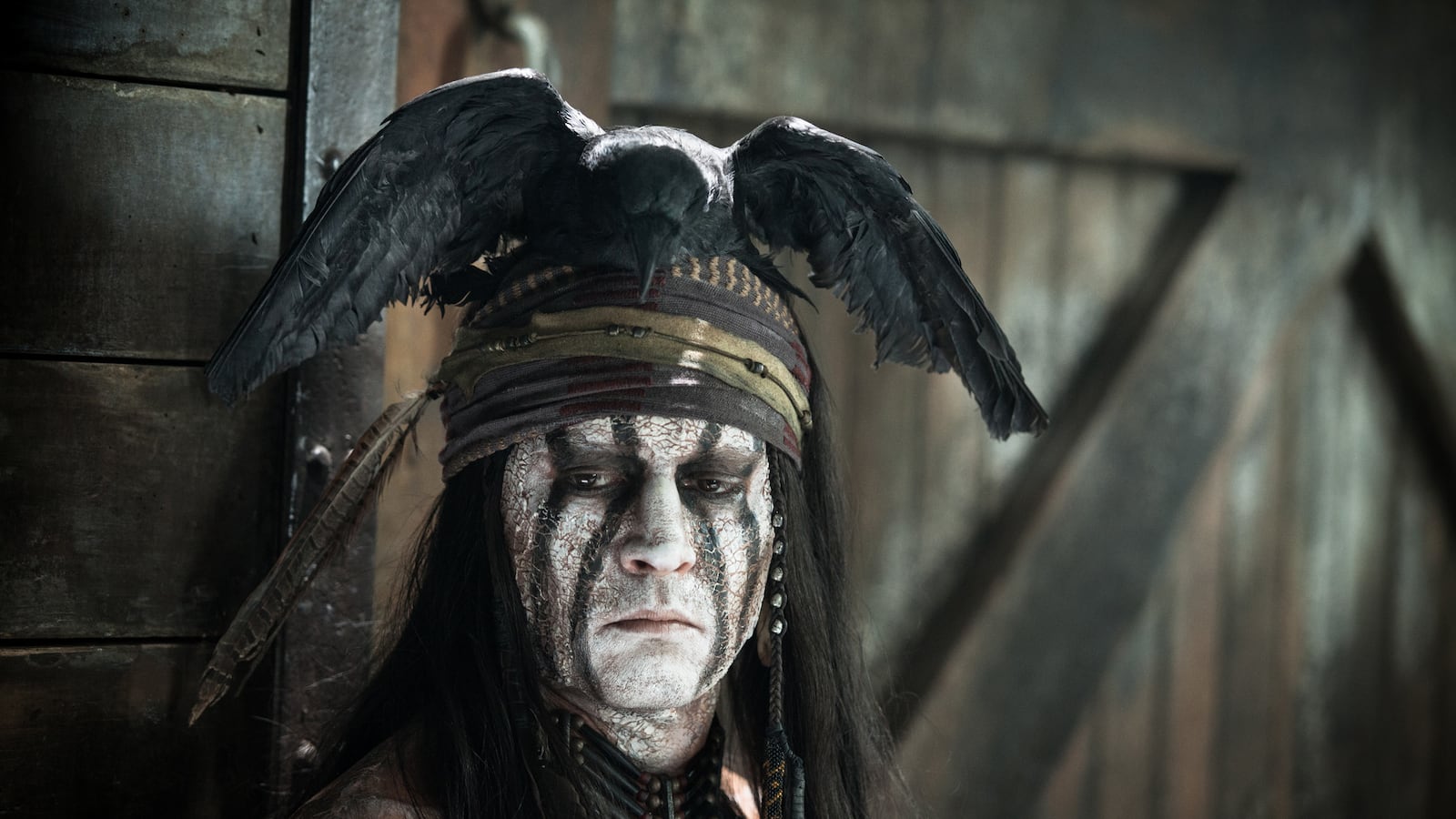I really like Johnny Depp. Always have, so I tried my best to reserve comment and judgment when it was announced he’d play Tonto in a movie remake of The Lone Ranger. The character is Native American, and Depp is not. (He claims he had a Cherokee great-grandmother. For the record, I had a Cherokee grandmother and I’m pretty sure Oprah did too. That does not make us Native American.) Still, I held out hope that somehow the superstar actor, who rarely makes a bad casting move, could magically make us all forget that playing this role—and the remake itself—was never a good idea.

Unfortunately, that didn’t turn out to be the case. Before I had the chance to see the movie, I read Depp’s Rolling Stone cover story and cringed as he talked about giving Native American kids hope with his performance. “They are living without running water and seeing problems with drugs and booze. But I wanted to be able to show these kids, ‘Fuck that! You’re still warriors, man,’” he said.
I’m sure Depp’s heart was in the right place when he made that comment, but boy, did he come off as condescending and clueless. He didn’t seem to get that if he’d really wanted to give hope to Native American youth, he would have declined the role and suggested that a Native American actor be cast as Tonto. Doing so would have gone a long way to prove to all minorities that Hollywood is finally becoming a fair and objective business dedicated to providing thought-provoking entertainment without intentionally offending anyone. Casting a Native American actor also might have provided the filmmakers with a more nuanced view of Native American culture. That’s something sorely lacking in Gore Verbinski’s The Lone Ranger.
Watching the movie only made matters worse for me, but not for the reasons you may think. It’s clear Depp, the screenwriters, producers, and other actors were well aware and concerned with how easily the film could perpetuate lingering stereotypes attributed to Native Americans. They obviously made a deliberate effort to give the character Tonto several deep “layers.” No doubt much effort was put into developing Tonto’s personality and backstory in ways the television series never did.
Still, all that does little to overcome or excuse the antiquated theme of minorities consistently being cast as the loyal sidekick or forever being in awe of their white counterparts. So much so that they feel obligated to recount the stories of their beloved “saviors” to anyone who’ll listen.The Lone Ranger begins with just that kind of scene, as a young white boy dressed as the masked hero wanders through a museum exhibition in San Francisco. He lands in front of the display “The Noble Savage in his Natural Habitat” and naturally, an elderly Tonto is the subject of the display. And naturally, Tonto comes to life when he sees the young boy so he can tell story of John Reid, the Lone Ranger. That’s where it all begins to fall apart.
In an effort to stay true to the 1933 setting, the elderly Tonto instantly deteriorates into the very stereotype the filmmakers seemed determined to avoid. He speaks in broken sentences, punctuated by the sound of rattling and tribal drums. He appears to be in touch with another world and talks to dead animals at will. The writers try to explain his mannerisms by revealing that Tonto has an intense guilt complex. As a kid, he told two white men where they could find his tribe’s silver. The white men went on to slaughter his family and friends. That trauma was the cause of his “broken mind.” This backstory is also supposedly the reason for Tonto’s separation from the remnants of his tribe and his friendship with the Lone Ranger.
But Tonto’s bond with the Lone Ranger seems totally at odds with the tremendous hate he clearly has for white oppression. It also doesn’t explain why he’d take sides with the Lone Ranger and not his own tribe when they all set out to take revenge on the film’s main villain, Butch Cavendish. Cavendish is responsible for killing Tonto’s family and the Lone Ranger’s brother. In an obvious setup for who ultimately becomes the hero of the film—bet you can’t guess who’s the white knight when the film is over—the Lone Ranger wants to take the high road and let justice take its course with Cavendish, while Tonto would rather kill him and take his revenge now. Tonto’s tribe wants the same, so why follow the Lone Ranger?
In the end The Lone Ranger is a confusing nearly three hours, overwhelmed by relentless violence and ill-timed jokes. Five years after the election of the first black American president, you’d think Hollywood would be a bit more thoughtful about the stories it green-lights—and much more conscious of the images it decides to bring back from the dead. R.I.P., Tonto.




